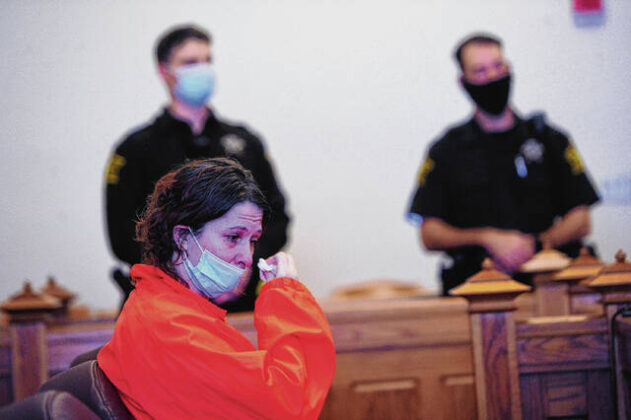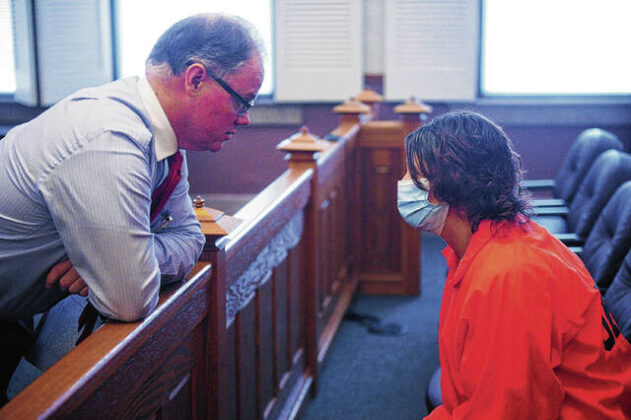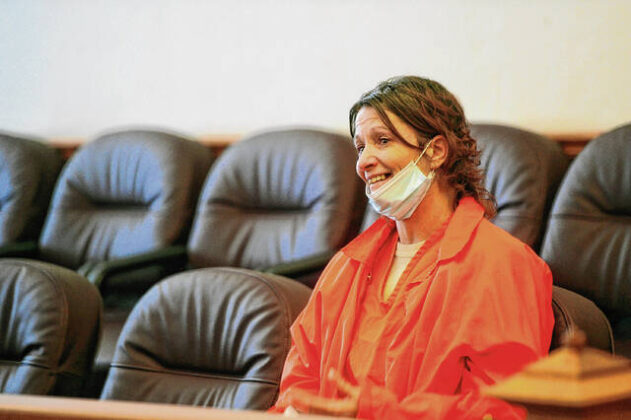
Judge D.J. Davis, who pushed for creation of the new court program, confers with Jennifer Coomer, who will be part of the program over the coming weeks.
Tom Russo | Daily Reporter
HANCOCK COUNTY — It’s not always easy for people to look at their actions and confront the issues that caused them to get in trouble with the law.
But some defendants are doing just that as part of the county’s new behavioral health court.
It took a little longer than court officials had hoped to get the program off the ground, but the first meeting of the new court took place Friday, Jan. 14, in Hancock County Superior Court 1 under the supervision of Judge D.J. Davis.
“It was great to get this finally started,” Davis said following the first session.
Davis has wanted to establish the new problem-solving court since before he took office in January 2021 as judge of Superior Court 1. Its goal is to address a defendant’s core behavioral problems and treat them rather than pushing the person through the court system without trying to resolve his or her underlying issues. If the program works, it will cut down on the number of people who cycle repeatedly through the court system.
Davis and the coordinator for the program, Kevin Minnick, had hoped to have it up and running in September, but finding time to get all the county’s judges on board; dealing with a sea of paperwork; COVID complications; and a desire to refine the way the program should work pushed back the start.
“There was just a lot of paperwork and things that we had to get into place and get ironed out,” Davis said.
That included getting officials from the prosecutor’s office and defense lawyers on board, gathering their suggestions and figuring out how the court program would operate and who would be allowed in. There was a strong desire by officials to make sure to get the right type of defendants involved, one willing to admit they have behavior issues and would be willing to work on them.
The first session last week operated pretty much how officials run the county’s well-established drug court program in Hancock County Circuit Court overseen by Judge Scott Sirk. There, defendants talk about their issues and treatment progress; hear from motivational speakers; and are held accountable for their actions — while trying to get their lives back on track.
“The programs look very similar,” Minnick said. “But, that being said, there will probably be less detail of what people are doing in our court because of the nature of mental health and the fact people will be on different tracks.”
Kim Hall, the executive director of Mental Health Partners of Hancock County, gave a presentation at the first meeting and told about how long people like Minnick and local attorney Jeff McClarnon have worked to get the program going.
“I didn’t realize that it had been almost 10 years since we first started on this project together,” Minnick said of his and McClarnon’s work. “It was nice to see it come to fruition today.”
While Davis admits it was frustrating not having the program rolling sooner, he was pleased the leadership team took the time to iron out issues and make sure the court, which will also focus on veterans, was set up the right way.
The original plan called for behavioral health court to have dozens of participants right away, but the first session opened with only two participants, one in person and the other watching via Zoom from the jail due to COVID restrictions. Participation numbers are expected to increase rapidly over the next few meetings, which are scheduled every other week.
“We only have the two participants right now, but we have some 20 defendants waiting in the hopper,” Minnick said.
Davis noted having only the two participants in the first session allowed them to dig a little deeper into each person’s issue and get the program off to a good start.
“It was good to hear them talk about the real reasons that got them in trouble,” Davis said.
The type of offender accepted into the new court program will vary, but all will be Level 4 felony offenders or below, officials said. There will be no mandate stating someone must first go through community corrections, home detention or probation before being allowed in.
Prosecutor Brent Eaton said his office is behind the new program and hopes it is successful in helping people deal with behavior issues that have caused them to land in jail.
“We want outcomes that are going to help the community be safe while dealing with mental health issues,” Eaton said. “If people can learn to deal with their issues this way and get real help, then they are more likely to not have to go see the sheriff at the jail.”
Eaton, who is on the drug court team, said he will do whatever is needed to support the Behavioral Health Court and noted when people are dealing with mental health issues and not pushing them aside, it’s good for public safety.
Davis asked each of the participants in the first meeting to use one word to describe their experience as they wrapped up the first session. One said they were “excited” while the other was “hopeful.” That, Davis said, is a good sign, but noted the participants must do their part to move forward, including taking medications prescribed by health officials who will also take part in helping those in the program.
“The participants are going to need to buy into what we’re doing,” Davis said. “They’ve got to have brand-new lifestyles and not go back to the way they used to live.”








